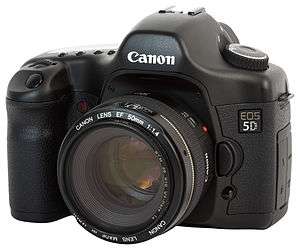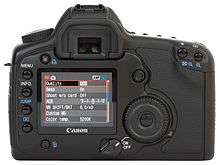Canon EOS 5D
 | |
| Type | Digital single-lens reflex |
|---|---|
| Lens | Interchangeable (EF) |
| Sensor | 35.8 x 23.9 mm CMOS (full-frame) |
| Maximum resolution | 4,368 × 2,912 (12.8 megapixels) |
| Shutter | electronic focal-plane |
| Shutter speed range | 30 to 1/8000 s and Bulb |
| ASA/ISO range | 50-3200 |
| Exposure metering | TTL, full aperture, 35 zones |
| Exposure modes | Full auto, programmed, shutter-priority, aperture priority, manual |
| Metering modes | Evaluative, Partial, Spot, C/Wgt Average |
| Focus areas | 9 user points + 6 assist points |
| Focus modes | One-shot, AI Servo, AI-Focus, Manual |
| Continuous shooting | up to 3 frame/s. |
| Viewfinder | Optical, pentaprism |
| Rear LCD monitor | 2.5 in (63 mm), 230,000 pixels |
| Storage | CompactFlash (CF) (Type I or Type II) |
| Battery | Li-Ion BP-511A Rechargeable |
| Optional battery packs |
BP-511A, BP-514, BP-511, BP-512. BG-E4 grip allows use of AA cells. |
| Weight | 810 g (body only) |
| Made in | Japan |
The EOS 5D is a 12.8 megapixel digital single-lens reflex (DSLR) camera body produced by Canon. The EOS 5D was announced by Canon on 22 August 2005,[1] and at the time was priced above the EOS 20D but below the EOS-1D Mark II and EOS-1Ds Mark II in Canon's EOS digital SLR series. The camera accepts EF lens mount lenses.
The EOS 5D is notable for being the first full-frame DSLR camera with a standard body size (as opposed to the taller, double-grip "professional" camera body style). It is also notable for its price, suggested at US$3299 sans lens,[1] which set a significant new low price point for full-frame DSLRs; its only full-frame competition at the time was the Canon 1Ds Mark II, which cost more than twice as much.[2]
On 17 September 2008, Canon announced the camera's successor, the Canon EOS 5D Mark II.[3]
Features
Sensor and image processing
The 5D has a DIGIC II 35.8 x 23.9 mm full-frame CMOS sensor with 13.3 million pixels (12.7 megapixel effective) and a pixel density of 1.5 megapixels per square centimetre. ISO speeds from 100 to 1600 are provided, adjustable in 1/3 steps (ISO can be expanded to L: 50 or H: 3200 with a menu function). The ISO 50 setting reduces dynamic range by a stop in the highlights.
Autofocus and metering
The 5D has nine autofocus points (plus six "invisible assist AF points" available only during continuous-focus tracking) arranged in a horizontal diamond pattern. The AF system was a minor upgrade to the one on the 20D. The camera uses TTL 35-zone SPC metering with four variations (evaluative, center-weighted, partial, spot) and exposure compensation of −2 EV to +2 EV in steps of 1/3 EV.E-TTL II flash metering is provided.
Shutter
The shutter is rated to 100,000 shots,[4] and is capable of speeds up to 1/8000 sec, with a flash sync speed of 1/200 sec.
Ergonomics

The 5D is very similar in design to the 20D, and most of the controls are identical or nearly so. Differences include:
- A much larger and brighter pentaprism viewfinder with approx. 96% coverage. This arrangement, borrowed from the 1D range, omits the pop-up flash of the consumer range.
- A larger, 230,000 pixel, 2.5" (63 mm) colour TFT liquid-crystal monitor
Speed
The 5D can shoot up to 3 frames per second, with a buffer that can store up to 60 frames in large JPEG mode, and up to 17 frames in RAW.
Physical dimensions
- Size (LxHxW): 152 x 113 x 75 mm (6.0 x 4.4 x 2.9 in)
- Weight (body only w/battery): 895 g
File numbering
The 5D is the first prosumer Canon DSLR where 9,999 images are stored to one folder (which was exclusive to the EOS-1D series), unlike its predecessors where 100 images are stored.
Software
The package includes the following software:[5]
- Digital Photo Professional
- ZoomBrowser EX / ImageBrowser
- PhotoStitch
- EOS Utility
- Picture Style Editor
See also
- Kodak DCS Pro SLR/c, an earlier Canon EF-compatible full-frame digital SLR
References
- 1 2 "NEW CANON EOS 5D IS A PREMIUM DIGITAL SLR AT AN AFFORDABLE..." (Press release). Canon. 22 August 2005.
- ↑ Askey, Phil (November 2005). "Canon EOS 5D Review". Dpreview.com. p. 32. Retrieved 9 December 2009.
- ↑ "CANON U.S.A. INTRODUCES THE HIGHLY ANTICIPATED EOS 5D MARK II DSLR..." (Press release). Canon. 17 September 2008.
- ↑ Canon's Official Website: Canon EOS 5D Digital SLR
- ↑ http://www.canon-europe.com/for_home/product_finder/cameras/digital_slr/eos_5d/index.asp?specs=1
External links
| Wikimedia Commons has media related to |
| Canon EOS digital camera timeline, 2010-present (comparison) | ||||||||||||||||||||||||||||||||||||||||||||||||||||||||||||||||||||||||||||||||||||||||||||||||||||||||||||||||||||||||||||||||||||||||||||||||||||||||||||||||||||||||||||||||||||||||||||||||||||||||||||||||||||||||||||||||||||||||||||||||||||||||||||||||||||||||||||||||||||||||||||||||||||||||||||||||||||||||||||||||||||||||||||||||||||||||||||||||||||||||||||||||||||||||||||||||||||||||||||||||||||||||||||||||||||||||||||||||||||||||||||||||||||||||||||||||||||||||||||||||||||||||
|---|---|---|---|---|---|---|---|---|---|---|---|---|---|---|---|---|---|---|---|---|---|---|---|---|---|---|---|---|---|---|---|---|---|---|---|---|---|---|---|---|---|---|---|---|---|---|---|---|---|---|---|---|---|---|---|---|---|---|---|---|---|---|---|---|---|---|---|---|---|---|---|---|---|---|---|---|---|---|---|---|---|---|---|---|---|---|---|---|---|---|---|---|---|---|---|---|---|---|---|---|---|---|---|---|---|---|---|---|---|---|---|---|---|---|---|---|---|---|---|---|---|---|---|---|---|---|---|---|---|---|---|---|---|---|---|---|---|---|---|---|---|---|---|---|---|---|---|---|---|---|---|---|---|---|---|---|---|---|---|---|---|---|---|---|---|---|---|---|---|---|---|---|---|---|---|---|---|---|---|---|---|---|---|---|---|---|---|---|---|---|---|---|---|---|---|---|---|---|---|---|---|---|---|---|---|---|---|---|---|---|---|---|---|---|---|---|---|---|---|---|---|---|---|---|---|---|---|---|---|---|---|---|---|---|---|---|---|---|---|---|---|---|---|---|---|---|---|---|---|---|---|---|---|---|---|---|---|---|---|---|---|---|---|---|---|---|---|---|---|---|---|---|---|---|---|---|---|---|---|---|---|---|---|---|---|---|---|---|---|---|---|---|---|---|---|---|---|---|---|---|---|---|---|---|---|---|---|---|---|---|---|---|---|---|---|---|---|---|---|---|---|---|---|---|---|---|---|---|---|---|---|---|---|---|---|---|---|---|---|---|---|---|---|---|---|---|---|---|---|---|---|---|---|---|---|---|---|---|---|---|---|---|---|---|---|---|---|---|---|---|---|---|---|---|---|---|---|---|---|---|---|---|---|---|---|---|---|---|---|---|---|---|---|---|---|---|---|---|---|---|---|---|---|---|---|---|---|---|---|---|---|---|---|---|---|---|---|---|---|---|---|---|---|---|---|---|---|---|---|---|---|---|---|---|---|---|---|---|---|---|---|---|---|---|---|---|---|---|---|---|---|---|---|---|---|---|---|---|---|---|---|---|---|---|---|---|---|---|---|---|---|---|---|---|---|---|---|---|---|---|---|---|---|---|---|---|---|---|
†The 1D series originally used an APS-H sensor, not a true full-frame sensor.
| ||||||||||||||||||||||||||||||||||||||||||||||||||||||||||||||||||||||||||||||||||||||||||||||||||||||||||||||||||||||||||||||||||||||||||||||||||||||||||||||||||||||||||||||||||||||||||||||||||||||||||||||||||||||||||||||||||||||||||||||||||||||||||||||||||||||||||||||||||||||||||||||||||||||||||||||||||||||||||||||||||||||||||||||||||||||||||||||||||||||||||||||||||||||||||||||||||||||||||||||||||||||||||||||||||||||||||||||||||||||||||||||||||||||||||||||||||||||||||||||||||||||||
| Canon EOS digital camera timeline, pre-2010 (comparison) | ||||||||||||||||||||||||||||||||||||||||||||||||||||||||||||||||||||||||||||||||||||||||||||||||||||||||||||||||||||||||||||||||||||||||||||||||||||||||||||||||||||||||||||||||||||||||||||||||||||||||||||||||||||||||||||||||||||||||||||||||||||||||||||||||||||||||||||||||||||||||||||||||||||||||||||||||||||||||||||||||||||||||||||||||||||||||||||||||||||||||||||||||||||||||||||||||||||||||||||||||||||||||
|---|---|---|---|---|---|---|---|---|---|---|---|---|---|---|---|---|---|---|---|---|---|---|---|---|---|---|---|---|---|---|---|---|---|---|---|---|---|---|---|---|---|---|---|---|---|---|---|---|---|---|---|---|---|---|---|---|---|---|---|---|---|---|---|---|---|---|---|---|---|---|---|---|---|---|---|---|---|---|---|---|---|---|---|---|---|---|---|---|---|---|---|---|---|---|---|---|---|---|---|---|---|---|---|---|---|---|---|---|---|---|---|---|---|---|---|---|---|---|---|---|---|---|---|---|---|---|---|---|---|---|---|---|---|---|---|---|---|---|---|---|---|---|---|---|---|---|---|---|---|---|---|---|---|---|---|---|---|---|---|---|---|---|---|---|---|---|---|---|---|---|---|---|---|---|---|---|---|---|---|---|---|---|---|---|---|---|---|---|---|---|---|---|---|---|---|---|---|---|---|---|---|---|---|---|---|---|---|---|---|---|---|---|---|---|---|---|---|---|---|---|---|---|---|---|---|---|---|---|---|---|---|---|---|---|---|---|---|---|---|---|---|---|---|---|---|---|---|---|---|---|---|---|---|---|---|---|---|---|---|---|---|---|---|---|---|---|---|---|---|---|---|---|---|---|---|---|---|---|---|---|---|---|---|---|---|---|---|---|---|---|---|---|---|---|---|---|---|---|---|---|---|---|---|---|---|---|---|---|---|---|---|---|---|---|---|---|---|---|---|---|---|---|---|---|---|---|---|---|---|---|---|---|---|---|---|---|---|---|---|---|---|---|---|---|---|---|---|---|---|---|---|---|---|---|---|---|---|---|---|---|---|---|---|---|---|---|---|---|---|---|---|---|---|---|---|---|---|---|---|---|---|---|---|---|---|---|---|---|---|---|---|---|---|---|---|---|---|---|---|---|---|---|---|---|---|---|---|---|
†The 1D series originally used an APS-H sensor, not a true full-frame sensor.
| ||||||||||||||||||||||||||||||||||||||||||||||||||||||||||||||||||||||||||||||||||||||||||||||||||||||||||||||||||||||||||||||||||||||||||||||||||||||||||||||||||||||||||||||||||||||||||||||||||||||||||||||||||||||||||||||||||||||||||||||||||||||||||||||||||||||||||||||||||||||||||||||||||||||||||||||||||||||||||||||||||||||||||||||||||||||||||||||||||||||||||||||||||||||||||||||||||||||||||||||||||||||||